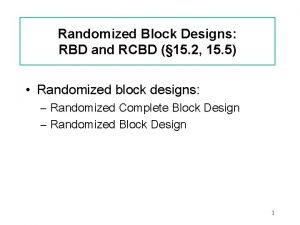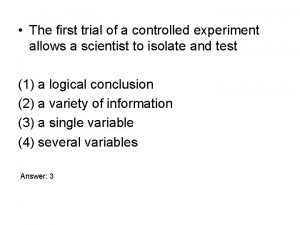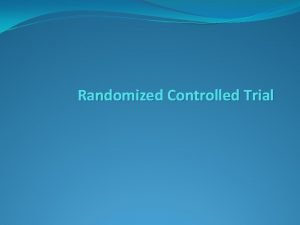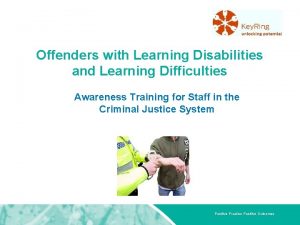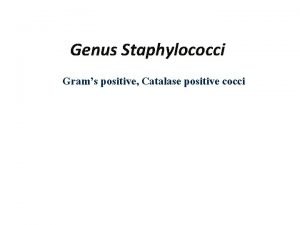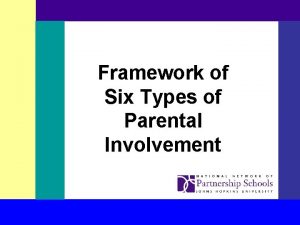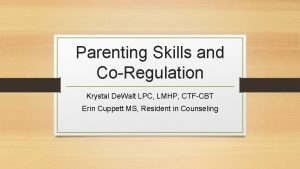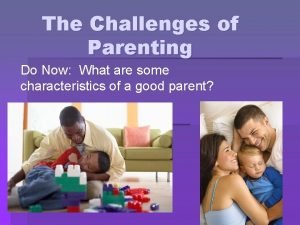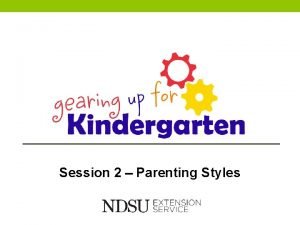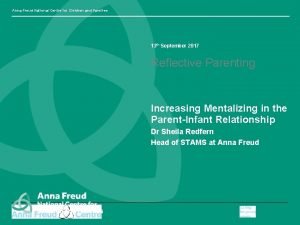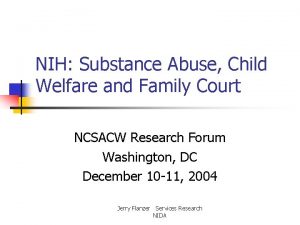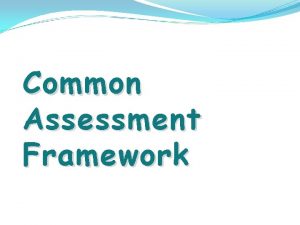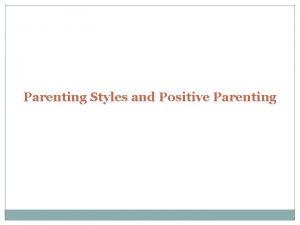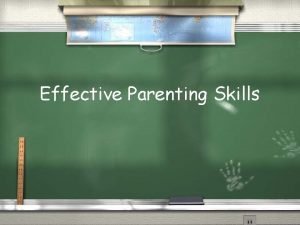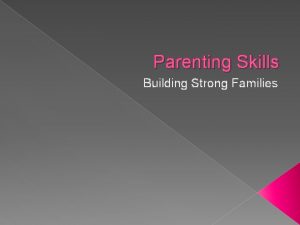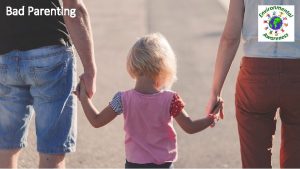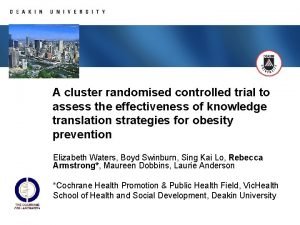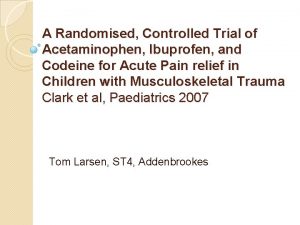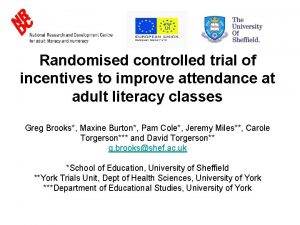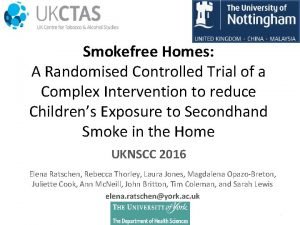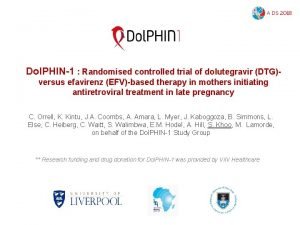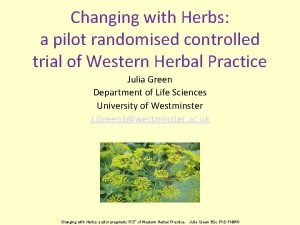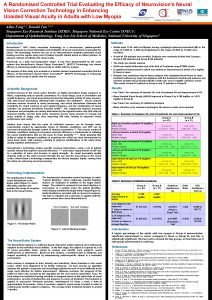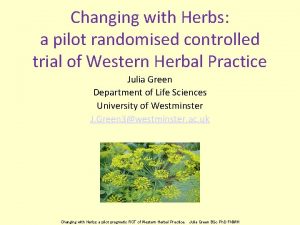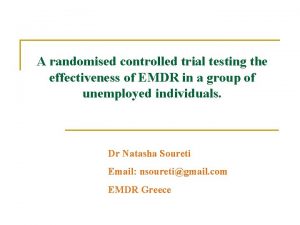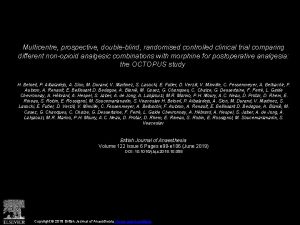Randomised controlled trial of Positive Parenting for Healthy




















- Slides: 20

Randomised controlled trial of Positive Parenting for Healthy Living (Triple P) for parents of children with eczema PRELIMINARY RESULTS Amy E. Mitchell 1, Alina Morawska 1, Emily Casey 2, Jennifer Fraser 3, Ania Filus 4 1 Parenting and Family Support Centre, The University of Queensland Service, Queensland Children’s Hospital (Brisbane) 3 Sydney Nursing School, The University of Sydney 4 Centre for Economic and Social Research, University of Southern California 2 Dermatology Email: a. mitchell 5@uq. edu. au

Conflict of interest • The Triple P – Positive Parenting Program is owned by The University of Queensland (UQ) • Triple P International Pty Ltd is licensed to publish and disseminate the program worldwide • Royalties stemming from published Triple P resources are distributed to the Faculty of Health and Behavioural Sciences at UQ, Parenting and Family Support Centre, School of Psychology at UQ, and contributory authors HFCC | 5. 2. 2020 CRICOS code 00025 B 2

Acknowledgements • This study is supported by the Children’s Hospital Foundation - Early Career Fellowship (2018 -2021) and Translator Grant (2018 -2020) (award ref. no. 50223). • Thank-you to the staff of the QCH Dermatology Service and Outpatients Department for their support of this research. HFCC | 5. 2. 2020 CRICOS code 00025 B 3

Childhood chronic illness • Affects 1 in 3 Australian children (AIHW, 2012) • Increased risk of: • • • Internalising & externalising behaviour problems Low parenting confidence Ineffective parenting practices Parent mental health & family stress ↓ Qo. L (child & family) • All contribute to problems with adherence & condition management (SR: Pinquart & Shen, 2011 a; 2011 b; 2011 c; Pinquart, 2013) HFCC | 5. 2. 2020 CRICOS code 00025 B 4

Pathways of impact Family stress Child health and wellbeing Parenting practices (Wood et al. , 2007) HFCC | 5. 2. 2020 CRICOS code 00025 B 5

Why eczema? Affects 17% of Australian children, increasing (Asher et al. , 2006) • Impact on quality of life (Lewis-Jones, 2006) • Rx – time-consuming, complex, costly, distressing; lack of cooperation from child (Su et al. , 1997; Chamlin et al. , 2004; Fisher, 1996) Adherence is an ongoing problem • 2/3 don’t adhere to Rx (Krejci-Manwaring et al. , 2007) • Difficult task, parents lack confidence (Zuberbier et al. , 2006) • Escalation of Rx, complications (infection), hospitalisation HFCC | 5. 2. 2020 CRICOS code 00025 B 6

Parenting matters…. • Parent-child relationships tend to be less positive - ↓ parental responsiveness, ↑ demandingness (control, monitoring, overprotection) (Pinquart, 2013) • Parenting factors and family stress can predict illness onset and disease course (Gustafsson et al. , 2002; Mrazek et al. , 1999) • Positive, confident and effective parenting associated with better management of chronic health conditions and better child adjustment (Davis et al. , 2001) • Better disease mgt + less severe disease associated with fewer child behaviour problems, more effective parenting style, parent self-efficacy with eczema mgt, parent self-efficacy with child behaviour mgt (Mitchell et al. , 2015, 2016) HFCC | 5. 2. 2020 CRICOS code 00025 B 7

Parenting intervention • Systematic review of parenting intervention in paediatric chronic illness context (Mitchell et al. , 2019) → effects on parenting behaviour & confidence, child adjustment, condition control/severity • Preliminary evidence for efficacy of brief parenting intervention (Morawska et al. , 2016, 2017 a, 2017 b) • ↓ use of ineffective parenting strategies • ↑ parenting confidence for managing eczema-related child behaviour difficulties • ↑ confidence with eczema management • ↓ parent-reported Sx severity • Next step → test effect on disease severity and adherence, delivery in HCS HFCC | 5. 2. 2020 CRICOS code 00025 B 8

Positive Parenting For Healthy Living positive parenting practices ineffective, coercive and inconsistent strategies daily routines child and family stress child behaviour problems child adjustment child resistance to health-related activities quality of life for the child and family medical adherence and child health HFCC | 5. 2. 2020 CRICOS code 00025 B 9

Study design & Assessment • Participants: 150 families of children with eczema (QCH Dermatology) • Recruitment: November 2018 – May 2020 • Randomisation: Intervention vs. Care as Usual (waitlist control) Visit 1: Enrolment; start monitoring Month Intervention families attend Triple P sessions 1 2 Visit 2: Baseline assessment 3 4 Visit 3: Post-intervention assessment 5 6 7 Visit 4: 6 -month follow-up assessment, end monitoring HFCC | 5. 2. 2020 CRICOS code 00025 B 10

Variable Measure Eczema disease severity Eczema Area Severity Index (EASI) (Tofte et al, 1998) Patient-Oriented Eczema Measure (POEM) (Charman et al. , 2004) 1° 2° Treatment adherence Medication Event Monitoring System (MEMS) Trackcaps Ineffective parenting Parenting Scale (Arnold et al. , 1993) Parent self-efficacy Child Eczema Management Questionnaire (Mitchell & Fraser, 2011) Child behaviour difficulties Eczema Behaviour Checklist (Mitchell et al. , 2017) Quality of Life Child Dermatology Life Quality Index (Lewis-Jones & Finlay, 1995) Dermatitis Family Impact Questionnaire (Lawson et al. , 1998) HFCC | 5. 2. 2020 CRICOS code 00025 B 11

Enrolment Assessed for eligibility (N=463) Excluded (n=418) No time (n=91) No eczema (n=79) No concerns (n=60) Not interested (n=50) Language (n=30) Distance (n=27) Dev. disorder (n=20) Currently completing T 1 assessment (n=6) Uncontactable (n=15) Overseas/Interstate (n=13) Done Triple P (n=12) Seeing psych. (n=10) No steroid (n=5) No T 1 assessment (n=4) Child age (n=2) Follow-up Allocation Randomised (n=37) Allocated to intervention (n=19) • Received allocated intervention (n=11) • Awaiting next group sessions (n=5) • Did not receive allocated intervention o Not contactable (n=1) o Withdrew (n=2) Lost to follow-up (n=3) • Not contactable (n=1) • Withdrew (n=2) Preliminary analysis (n=11) Allocated to care as usual (n=18) Lost to follow-up (n=0) Preliminary analysis (n=17)

Demographics (n=28) • Parent age = 37 years (range 27 -49) 75% mothers, 25% fathers • Child age = 5 years (range 2 -10) 57% girls, 43% boys • 89% 2 -parent families, 11% sole-parent families • 7 -17% of families unable to meet essential expenses • Over the past 6 months: 14% hospitalised (range: 1 -5 times) 57% of parents took time away from work 75% of children took time away from school/kindy/day care AACBT | 25. 10. 19 CRICOS code 00025 B 13

Disease/symptom severity Disease severity (clinician-rated) Symptom severity (parent-rated) 20 12 18 10 16 POEM score EASI score 14 12 10 8 6 4 2 2 0 0 Mild Moderate Severe Clear/almost clear Mild Moderate Severe Very severe 14

Preliminary Results - Primary Outcomes Parent-rated symptom severity Clinician-rated disease severity 25 25 p=. 919 20 POEM score 20 EASI score p=. 304 15 10 5 5 0 0 Pre Post CAU INT Clinical improvement (≥ 3. 4): 27% INT vs. 7% CAU 15

Preliminary Results - Secondary Outcomes Laxness Ineffective Parenting 5 5 5 p=. 006 2 3 2 1 1 0 0 Pre Post CAU INT PS Overreactivity Score PS Laxness Score 3 p=. 005 p=. 008 4 4 PS Total Score Overreactivity 4 3 2 1 0 Pre CAU Post INT Pre Post CAU INT 16

Eczema behaviour difficulties Eczema behaviour – confidence 150 10 275 100 75 8 225 CEMQ SE score EBC Confidence score 125 175 125 6 4 50 75 2 25 25 0 Pre CAU Post INT p=. 714 p=. 331 p=. 024 EBC Extent score Self-efficacy with eczema management Pre CAU Post INT Pre Post CAU INT 17

Impact - child Qo. L Impact - family Qo. L 20 30 15 20 p=. 263 10 DFIQ score CDLQI/IDLQI score 25 p=. 488 15 10 5 5 0 0 Pre CAU Post INT Pre Post CAU INT 18

Conclusions • First controlled trial of a parenting intervention for children with eczema to examine effect on adherence & disease outcomes • Preliminary results demonstrate: • ↓ use of ineffective parenting strategies • ↓ child behaviour difficulties • ? trends toward improved Sx severity and Qo. L • Expand to include community-recruited subsample https: //parenting. firstcry. com/articles/eczema-in-babiesreasons-symptoms-treatment/ • Data collection concluding December 2020 HFCC | 5. 2. 2020 CRICOS code 00025 B 19

Thank you! Dr Amy Mitchell | Research Fellow Parenting and Family Support Centre a. mitchell 5@uq. edu. au 07 3346 1202
 Rbd design
Rbd design Crd rcbd
Crd rcbd The first trial of a controlled experiment allows
The first trial of a controlled experiment allows Advantage of randomized controlled trial
Advantage of randomized controlled trial Healthy forests healthy communities poster ideas
Healthy forests healthy communities poster ideas Healthy nurse healthy nation
Healthy nurse healthy nation Healthy food healthy mind journal
Healthy food healthy mind journal Healthy soil healthy life poster ideas
Healthy soil healthy life poster ideas Positive + positive equals
Positive + positive equals Positive practice positive outcomes
Positive practice positive outcomes S. agalactiae catalase test
S. agalactiae catalase test Parent types
Parent types What is co regulation
What is co regulation Challenges of parenting
Challenges of parenting Slides templates
Slides templates Objectives of parenting styles
Objectives of parenting styles Freud and parenting
Freud and parenting Unengaged parenting
Unengaged parenting Sai parenting
Sai parenting Caf children
Caf children 4 parenting styles
4 parenting styles
